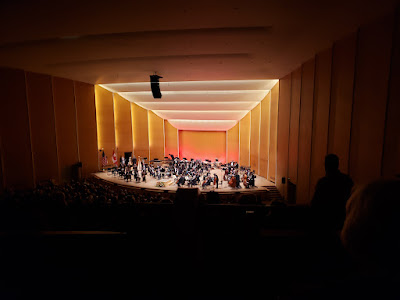 |
| The BPO, from where I sat. |
By MARY KUNZ GOLDMAN
Former Buffalo News Classical Music Critic
Saturday, JoAnn Falletta and the Buffalo Philharmonic Orchestra kicked off her 25th anniversary season with what promised to be a night to remember.
The music was all Russian, all popular. On the program was Moussorgky's "Pictures at an Exhibition," in the Ravel orchestration. Star violinist Gil Shaham was playing the Tchaikovsky concerto.
The crowd was big, almost a full house. They loved what they heard. That Tchaikovsky!
You will never hear this concerto sound better.
Listening to Shaham play and dance his way through the piece, I could not stop smiling. I have not been to the BPO for maybe four years now, and this performance made me think of how much I have been missing.
 |
| Gil Shaham |
He played the concerto with beauty and feeling, bringing out the tenderness of Tchaikovsky's beautiful melodies. Those whispery low passages. Those high notes! My brother George said
later: "He could get music out of fishing wire or a string of dental
floss." Funny! But true.
Shaham matched Falletta's great sense of timing. And he moves about more than your usual soloist. Sometimes he stamps his feet in time with the music -- thanks to Kleinhans' famous acoustics, you can hear his shoes hitting the floor. Turning this way and that, he sometimes veered perilously close to Falletta. At one point it looked, seriously, as if they were going to collide.
There was real drama. In the last movement, Tchaikovsky gives you that troika melody, so Russian, so contagious. Shaham threw himself into it, bringing out the rhythm, which could make you think of "The Nutcracker." Glancing from my balcony seat into a stairwell, I glimpsed the ushers on the steps, two young ladies, completely absorbed, bobbing their heads in time to the troika. That says a lot. Ushers are a tough crowd.
Shaham played no encore. I couldn't believe it. People applauded and applauded, and the violinist, beaming, acknowledged the applause happily. However, no encore.
This was a first, as far as I could recall, for a season-opening gala. The soloist always did an encore, always. This time, though, no.
It was not the only unusual thing about the evening. The format was experimental, as opening galas go.
The concert began at 7 p.m., timed to end around 8:30. There was no intermission. Before the concert, a festive crowd was gathered outside, enjoying a reception by the reflecting pool. It was beautiful to see. A gala dinner for donors, which used to take place before the opening concert, had been moved until after the concert.
The timing seemed to give the concert a less formal vibe. With no intermission, there was less chance to see and be seen (and Kleinhans, with its balconies overlooking the main lobby, is an epic place to do that).People want to greet other concertgoers, see who is there, celebrate.
My brother George was the only gentleman I saw wearing a tie.I am guessing, too, that the absence of an intermission also threw off people's sense of timing. After the first movement of the Tchaikovsky, there was a torrent of applause, and listeners began making moves to leave. It's nice to see newcomers -- however having already listened to "Pictures at an Exhibition," and with only a few minutes' break between the pieces, they thought the concert was over.
Even Shaham seemed to stand less on ceremony. Since long before any of us was born, soloists have emerged dramatically from the wings, as the audience applauds. He did not do that. He just sort of appeared when no one was looking, and the Tchaikovsky concerto began without fanfare. He is a modest sort, and he did launch the piece with tremendous poetry. However I prefer to stand by tradition. We get so little pageantry in life these days. Plus, a formal entrance adds to the showmanship, and helps you settle in for what you are about to hear.
Which, in this case, was wonderful throughout. "Pictures at an Exhibition" made the case for live concerts. Heard on a record, it might not grab you. In person, you can't look away.
It was a tour de force for the winds and the brass. There were percussion sounds I do not think I have ever heard. The growling trombones, the fluttering flutes, the glitter and pizzazz -- it was like watching a circus parade.
Falletta and the musicians paced it with supreme finesse, saving their thunder. At the end, we got that thunder, with timpani and other percussion going full blast. It felt as if you could hear "The Great Gates of Kiev" in, well, Kiev. No wonder the crowd cheered.
Mary Kunz Goldman was the longtime classical music critic for The Buffalo News, the daily paper of Buffalo, N.Y.










